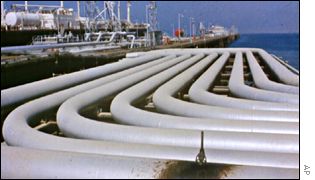| CATEGORIES | TV | RADIO | COMMUNICATE | WHEREILIVE | INDEX | SEARCH | |||||||
|
| You are in:World: South Asia | ||||||||||||||||||||||||||
|
|
Monday, 29 October, 2001, 20:56 GMT
Afghanistan: the pipeline war?

Some commentators have asked if it's all about oil
By BBC Eurasia Analyst Malcolm Haslett
Some attractively original theories have been going the rounds about the real reasons for the Afghan war. It is obviously much more, some columnists and political theorists suggest, than a simple effort to stamp out terrorism. Apart from the popular theory (in some parts of Europe as well as the Middle East) that this is a war on Islam, there is also the theory that it is a war motivated mainly - or even purely - by long-term economic and political goals. The importance of Central Asian oil and gas has suddenly been noticed. The valuable deposits of fossil fuels in Kazakhstan, Turkmenistan and Azerbaijan, previously discussed only by regional experts and international energy companies, are now being mulled over on the opinion pages of popular dailies. Economic imperatives The Afghan war, it has been discovered, has an economic side to it.
If one discounts the more extreme and emotional versions of this theory, the argument boils down to this:
Flawed theory This line of argument falls down on a number of points. It is undeniably true that the Central Asian republics do have very significant reserves of gas and oil, and that they have been having difficulty in getting them on to the world market on conditions favourable to them. Until recently Russia had an almost total monopoly of export pipelines, and was demanding a high price, in economic and political terms, for their use.
On the contrary, very few western politicians or oil companies have taken Afghanistan seriously as a major export route - for the simple reason that few believe Afghanistan will ever achieve the stability needed to ensure a regular and uninterrupted flow of oil and gas. There have been exceptions, of course, like Unocal and the Argentine company Bridas. The main proponents of the Afghan pipeline idea, however, apart from the Taleban regime itself and its backers in Pakistan, was the government of the eccentric Turkmen President Saparmyrat Niyazov, known as "Turkmenbashi". Caucasus route The West, in contrast, and particularly the US, has put almost all its efforts into developing a major new route from the Caspian through Azerbaijan and Georgia to the Black Sea. This had the potential advantage (from a western point of view) of bypassing Russia and Iran, and breaking their monopoly of influence in the region - allowing the states of the Caucasus (Georgia, Azerbaijan and possibly Armenia) and Central Asia (Kazakhstan, Turkmenistan, Uzbekistan and Kyrgyzstan) to develop a more balanced, independent foreign policy.
They also now fear that the Central Asians' willingness to entertain US forces on their territory could substantially increase US influence in the region. Such a scenario, however, is far from certain. The western powers have caused considerable annoyance among the authoritarian regimes of Central Asia by harping on human rights abuses - particularly, incidentally, against Muslims - and the need for greater democratisation. It seems highly unlikely, moreover, that the US-led "Coalition against Terrorism" has any illusions about how "pro-western" any potential new Afghan Government would be. The main prerequisite for the survival of a new administration in Kabul, is that it win wide acceptance among the various ethnic and political groupings in Afghanistan itself. No US stooges And very few of those groups are exactly pro-western. Western influence in Afghanistan would, at best, remain shaky. In addition, if peace and stability were to return to Afghanistan, and a new pipeline to Central Asia was to be built, the principal beneficiaries would undoubtedly be the Afghans, as well as Pakistan, Turkmenistan, and the other Central Asians. In brief, then, considerations of economic and political influence will undoubtedly play a part in western strategies in Afghanistan. It would be strange if they did not. But the argument that these are the main motivations behind US actions, not the desire to stamp out international terrorism, will probably find support mainly among those who already have a fondness for conspiracy theories.
|
See also:
Top South Asia stories now:
Links to more South Asia stories are at the foot of the page.
|
||||||||||||||||||||||||
Links to more South Asia stories
|
|
|
^^Back to top News Front Page | World | UK | UK Politics | Business | Sci/Tech | Health | Education | Entertainment | Talking Point | In Depth | AudioVideo ---------------------------------------------------------------------------------- To BBC Sport>> | To BBC Weather>> ---------------------------------------------------------------------------------- MMII | News Sources | Privacy |
|